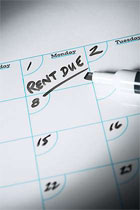The New York Times this weekend released the results of [an analysis of the costs and benefits of home ownership and renting, considering the tax benefits [NY Times].](http://www.nytimes.com/2005/09/25/realestate/25cov.html?pagewanted=print) It is a difficult topic to cover.
The article concludes that now may be a better time to rent than buy since prices are rising, rents are just beginning to rise and buyers place too much emphasis on the tax deduction.
We have to give credit to the New York Times Real Estate Section for publishing this analysis since they depend largely on advertising revenues from real estate brokers. Whether or not you agree with their analysis, it is refreshing to see this sort of thing.
One point of contention I have with articles like this is the concept of valuing the bundle of rights of ownership. This is left largely out of rent to value equation because it is so subjective. For example, the Economist magazine has been trying to call the [collapse of the housing market for the past 4 years [Economist]](http://www.economist.com/displaystory.cfm?story_id=S%27%29H0%25QQ%5B%24%210%208%0A&tranMode=none) using the spread between rents and sales prices as the predictor of housing price inflation but does not attempt to quantify home ownership within their analysis.

Nearly every article like this has an advantage of ownership as a feature such as the freedom to change the “color of their living room walls,” but its not quantified. It seems to me that the rent that a property is worth does not reflect all components of its value.
In other words, if a premium is placed on owner occupancy in a given market, then the value to the purchaser would be higher for an owner occupant than it is to an investor. For example, even during the darkest days of the recession in New York, the Manhattan townhouse market reflected a premium for single family houses over two to four family houses. The rental income of the units in the building did not justify the prices being paid for two to four family houses using the multipliers and overall cap rates used by investors at that time as buyers opted to convert these houses to single family.
Using rents as the only way to quantify use and enjoyment of a property paints an incomplete picture.
In addition, the rent versus buy decision should only apply on a case by case basis. It sort of like saying that nationally housing prices went up x% and then applying that amount to your property. The same goes for the opposite end of the spectrum. Rosy reports of rising prices do not always apply to all properties in the same manner.
Related Links[Housing: Buy or Rent [Angry Bear]](http://angrybear.blogspot.com/2005/09/housing-buy-or-rent.html)[NYTimes: Is It Better to Buy or Rent? [Calculated Risk]](http://calculatedrisk.blogspot.com/2005/09/nytimes-is-it-better-to-buy-or-rent.html)
One Comment
Comments are closed.



This is a great article. While lay-persons may have missed it, finally someone reminds us “professionals” that there are in fact still three approaches to estimate market value in real estate. (For those who don’t know, the three are the sales comparison, income and cost approaches. Each approach reflects the options available to a typical user who can purchase, rent or build a property suitable for their needs.) Those three principles reflect the well thought out analysis of market forces, with the conclusion that over the long run, markets naturally balance themselves by removing inefficiencies. So either the rental market must see significant rent increases, or the housing market really is in a bubble. Considering that many tenants rent out of financial necessity (i.e. limited income), it would seem unlikely rents have enough upside potential to compensate for this spread.
As further evidence to support this article, one should also look at the cost approach and there is ample data to suggest just how hot this market is. Case in point, the “seasoned” developers have been complaining for the past couple years about new investors bidding up the price of land. These newbie’s slap down a house and sell it with plenty of surplus (profit) to make up for their lack of experience. When the premium between cost to build and market value are this out of sync, something has to move to bring the market back into alignment.
If anyone thinks that a market, any market, can sustain itself under such inefficient conditions, they are wrong. Especially here in America, the home of market efficiency. It’s why we Americans can maintain such a high standard of living, despite a world bathed in cheap labor, utilized in combination with high technology and massive transportation infrastructure. A market, be it a so called bubble or bust, should not to be measured by how high it is in relationship to itself, but rather how it compares to the alternatives. And it is the alternatives that keep the markets in sync.